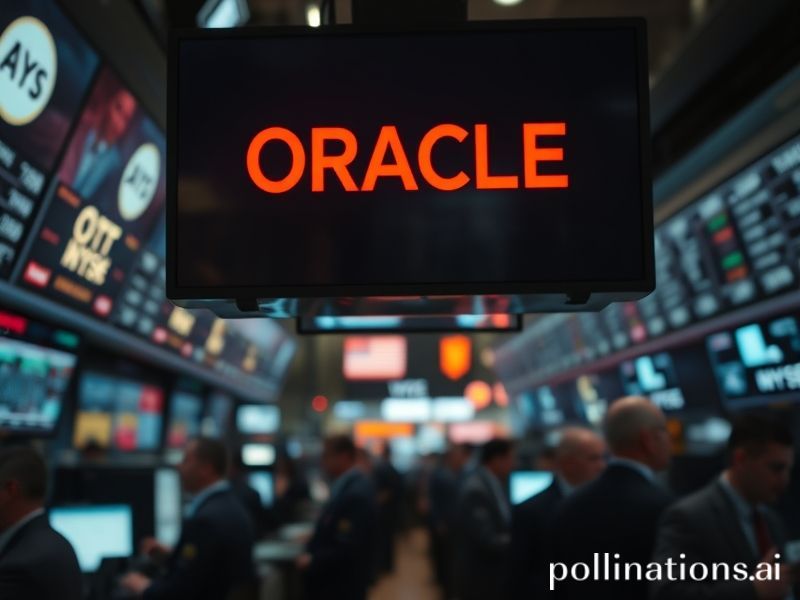Oracle’s Global Victory Lap: How One Database Firm Became the World’s Quiet Landlord
Oracle’s Q3 Earnings: A Tragicomedy Staged on Five Continents
By Our Man in the Cloud
If you squinted at the after-hours ticker from a bar in Singapore—or a bunker in Kyiv—you’d have seen the same blink: ORCL up 12%, then 14%, then a sheepish retreat to +11.8% once the analysts remembered how to exhale. It was the sort of knee-jerk euphoria normally reserved for World Cup upsets or the discovery that your national airline still serves free wine. Only this time the winning goal was scored by a 47-year-old database firm from Redwood City whose name, for reasons no linguist can explain, now doubles as a Marvel villain.
The headline numbers sounded like the setup to a joke Larry Ellison might tell at Davos while swirling a Negroni: cloud revenue up 54%, total revenue $13.3 billion, net income up 27%. Cue champagne in Silicon Valley, mild confusion in Frankfurt (where SAP executives reportedly Googled “auto-renew existential dread”), and a collective shrug in São Paulo, where the real clouds are currently dumping enough rain to make Noah consider IPO’ing his ark as a REIT.
But the market’s Pavlovian tail-wagging masks a darker punchline. Oracle’s surge isn’t just another American tech flex; it’s the latest reminder that the planet has quietly subcontracted its memory to a handful of West-Coast server farms. From Lagos fintechs storing Know-Your-Customer selfies to Seoul’s 3 a.m. gaming addicts, humanity’s selfies, spreadsheets, and sins now sit on the same metal—commodity hardware wrapped in proprietary swagger. Oracle’s cloud wins, therefore, read less like capitalism’s triumph and more like a global surrender ceremony, officiated by a man worth $150 billion who still hasn’t figured out how to smile.
The geopolitical subplot is richer than the foam on that aforementioned Negroni. Washington’s export bans on advanced chips? Oracle dodges them by renting cycles in sovereign clouds from London to Dubai, effectively turning national borders into billing addresses. The EU’s GDPR, meanwhile, has become the bureaucratic equivalent of a Victorian chastity belt—imposing, loudly advertised, and bypassed by anyone with a VPN and a sense of irony. Somewhere in Brussels, an underpaid regulator just sighed into a lukewarm Orval, realizing that “data localization” now means “stored in the same region, owned in Delaware.”
And then there’s TikTok—yes, the dancing-teen app that American politicians fear more than unsecured voting machines. Oracle’s role as its “trusted technology partner” (translation: algorithmic babysitter) turns the company into the digital Switzerland of U.S.–China relations. Picture neutral ground, if neutral ground were air-gapped in a Utah desert and guarded by ex-NSA contractors who bill by the microsecond. The arrangement is so cynically elegant it deserves its own HBO miniseries, ideally scored by the same composer who did Succession.
Emerging markets, ever the designated extras in this drama, watch with the weary wisdom of people who’ve seen worse. Indian IT services firms—those original outsourcers of the American dream—now rent Oracle’s Gen2 cloud to run American tax software for American firms employing American workers who still can’t figure out withholding. The circle of life, but with more PowerPoint. Meanwhile, African telcos tout “local cloud zones” that are, in fact, Oracle racks wearing dashiki-colored bezels. Colonialism 2.0: now with 99.99% uptime SLAs.
Which brings us to the small matter of sustainability. Oracle promises “carbon-neutral by 2025,” a pledge that sounds bold until you realize it’s achieved partly by buying offsets from a Scottish wind farm whose turbines are visible from the 18th hole at Trump International. Greta Thunberg did not immediately return our request for comment, presumably because she was busy deleting her own Oracle-authenticated student records.
In the end, ORCL’s overnight pop is merely the market’s way of acknowledging an uncomfortable truth: we no longer store data, we store ourselves—photos, debts, political preferences, and that one PDF instruction manual for the air-fryer we bought in lockdown. Oracle just happens to be the warehouse, the landlord, and, increasingly, the sheriff auctioning off the storage units when payments lapse. The stock may zigzag with every Fed whisper or yuan hiccup, but the trajectory feels pre-written: more servers, more borders crossed, more humanity uploaded to a place that charges by the millisecond and forgets nothing—except, perhaps, how to log off.







